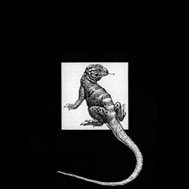

|
'There is in the Louvre a carved green steatite vase, inscribed c. 2025 B.C.
by
King Gudea of Lagash, dedicated to a late Sumerian manifestation of this
consort of the goddess, under his title Ningizzida, "Lord of the Tree of
Truth." Two copulating vipers, entwined along a staff in the manner of the
caduceus of the Greek god of mystic knowledge and rebirth, Hermes, are
displayed through a pair of opening doors, drawn back by two winged dragons
of
a type known as the lion-bird.'
The winged dragons or lion-birds, which are equivalent to cherubs or angels link this image to the much later archetype of Lucifer, the favorite angel of God, who is transformed into the rejected child or angel and is seen as a serpent. Both images of serpent and angel appear in the later Paradise myth, the Serpent as the deceiver of Adam and Eve and the Lion-birds as the angels or cherubim who guard the entrance to Paradise with flaming swords. |

|
|
return to chapter & page index |
|
Sign
the Dreambook
![]() Read
the Dreambook
Read
the Dreambook

|

|

|

|

|

|

|

|

|

|

|

|

|

|

|

|
 |
 |
 |
 |
 |
|
| Works |
Lyrics
& Poems |
Gallery |
Guestbook
Archive |
Links | Discography |
E-mail:
Peter Sinfield Jon Green |
Page One |

 Arachnophilia
Arachnophilia